Project Gigabit progress update, December 2023
Published 15 December 2023

Foreword
We know how important it is for homes, businesses and our vital public services to have fast and reliable digital connectivity. We’re focusing on rolling out game-changing gigabit broadband to ensure people across Britain can get the connectivity they need for decades to come. We know the shift will deliver a huge leap forward - opening up infinite possibilities for technology, healthcare, education and more.
As family and friends come together over the festive season to stream their favourite Christmas films, and shop online - battling bandwidth could be a common occurrence for many households across the country. Thanks to the hard work of the telecoms industry and government action, gigabit coverage across the UK has increased rapidly in recent years - from one in ten households in 2019 to nearly eight in ten today. These gigabit networks enable entire families to use multiple digital devices at the same time without any disruption but also support businesses to boost growth and innovation.
We have made rapid strides with the rollout of Project Gigabit, working with a dynamic range of telecom providers of all sizes to deliver one of the largest ever upgrades to our digital infrastructure. Since our first contract signature in North Dorset last August to the latest £33.4m signing in Derbyshire today - the UK government has invested over £660m to connect over 400,000 rural premises to the digital fast line. Alongside Derbyshire, in recent months, we have signed contracts in Oxfordshire and North East Staffordshire. We are not resting on our laurels with hundreds of thousands more homes and businesses set to benefit as part of our mission to level up digital connectivity across the UK.
The publication of Building Digital UK’s first Annual Report and Accounts marks an important milestone for the organisation responsible for the rollout of broadband to areas where the commercial market won’t reach. I’m delighted to see that BDUK exceeded its target for the year, passing 162,600 rural homes and businesses with gigabit-capable broadband. This excellent progress means that in total, BDUK has now delivered gigabit connectivity to over 900,000 premises across the UK that would have otherwise missed out - underlining how this work is more important than ever.
The difference that fast, reliable broadband makes to local communities is clear to see – especially if you’re in an area where good connectivity has been hard to come by in the past. In November, I visited Wychwood library in North Witney, Oxfordshire, to see first hand how local residents in the community are benefiting from an upgraded broadband connection as part of our GigaHubs programme.
The new gigabit-capable infrastructure has enabled the library to decrease operating expenses and improve energy efficiency, resulting in cost savings and a more productive environment for both staff and visitors. Working in partnership with Oxfordshire County Council, the GigaHubs programme will help improve the delivery of public services across the county. GPs will be able to provide remote video consultations and whole classes of schoolchildren can be online at once with no interruptions. It’s great to see the positive impact Project Gigabit is making to our vital public services.
We are committed to delivering high-speed connectivity to all four corners of the UK - ensuring rural communities have the same chances and opportunities as our towns and cities. We have been working closely with our counterparts in the devolved administrations and I’m pleased to announce that we have now added Project Gigabit procurements in Scotland, Northern Ireland and Wales to the Project Gigabit pipeline.
2024 will be an important year for the country’s gigabit future. BDUK has worked hard to identify the premises most in need of subsidised gigabit connectivity and is working with a range of suppliers to roll out broadband to these hard-to-reach areas. Throughout 2024, we will need to continue to work with our partners to target the areas of greatest need and complement suppliers’ own commercial delivery plans. Project Gigabit is a true partnership and together, we are transforming lives for generations to come.
Sir John Whittingdale MP, Minister for Data and Digital Infrastructure
Summary
Project Gigabit continues to make good progress. We now have 16 contracts in place, and combined with our procurements running across the country, this represents over £2 billion of investment to support the deployment of gigabit-capable broadband to over 1.1 million premises in hard-to-reach areas across the UK.
Since our September 2023 update we have:
- signed four regional and local contracts including in North East Staffordshire, North Oxfordshire, South Oxfordshire and Derbyshire. Combined, these contracts represent £76 million of government investment to deliver gigabit-capable broadband to up to 33,000 premises
- added potential Project Gigabit procurements in Scotland and Northern Ireland to the procurement pipeline which will cover up to 160,000 premises
- published three evaluation and research reports looking at the impacts, costs and benefits of our legacy programmes
Additionally, ThinkBroadband reports that over 79% of UK premises are now able to access a gigabit-capable connection. [footnote 1]
On 21 November, BDUK published its first Annual Report and Accounts, reporting our performance during the period 1 April 2022 to 31 March 2023.
We exceeded our Project Gigabit delivery target for the year, passing 162,600 premises with gigabit-capable broadband (against the minimum target trajectory of 133,000 set out in our latest Corporate Plan). In total, we reported that we have delivered gigabit connectivity to 929,700 premises by the end of March 2023, in mostly hard-to-reach communities across the UK.
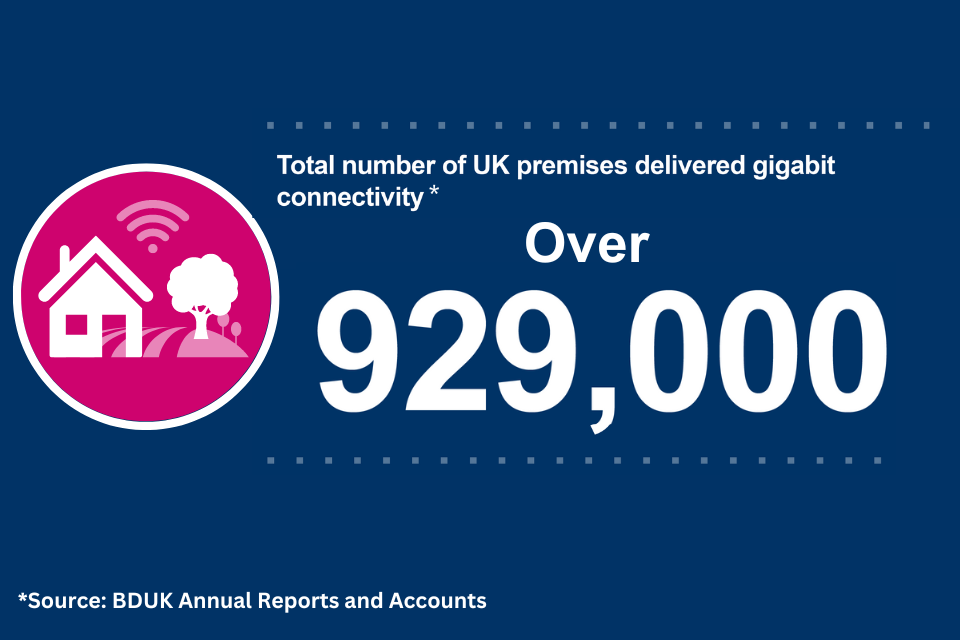
The analysis in the performance report shows that our interventions remain highly targeted at the hardest to reach premises in the UK:
- 146,000 (90%) of the premises passed in 2022 to 2023 were in areas classified as “rural”
- 99,300 (61%) of the premises covered by BDUK subsidies last year previously only had access to sub-superfast connections
For further information, please visit this link.
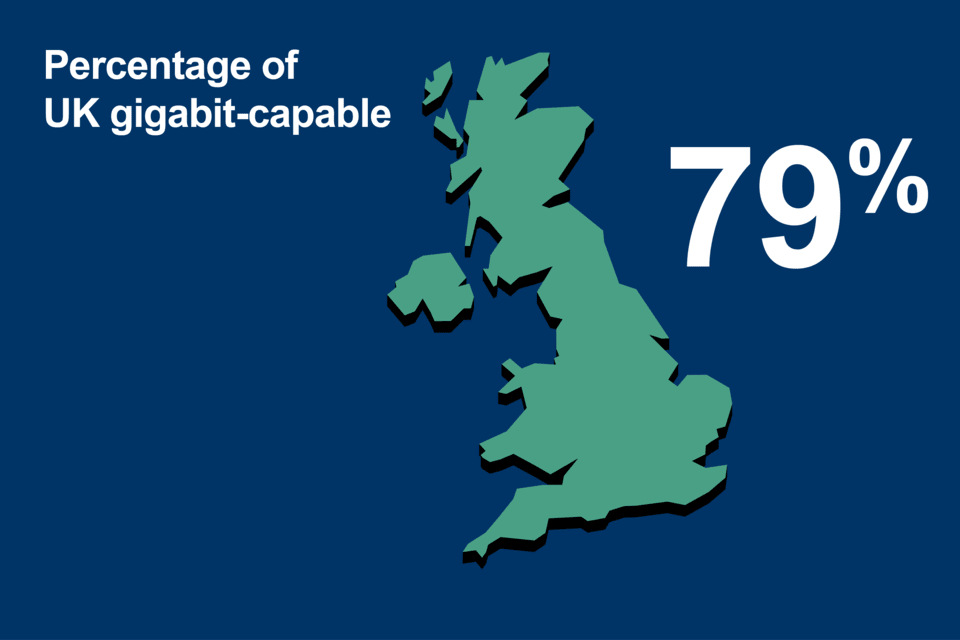
Progress towards a gigabit UK
This section outlines the level of gigabit-capable coverage across the devolved administrations and local areas in England with devolution deals, in urban and rural areas, by supplier and by residential and business premises.
Data from Ofcom’s Connected Nations shows the progress in expanding gigabit-capable broadband to premises across the country. Ofcom is expected to update its Connected Nations report in December 2023, and therefore the figures that feature in this report are the same as published in our September update.
More recent coverage data provided by ThinkBroadband at a devolved administrations level shows growth in every part of the UK. Since September 2023, gigabit capable coverage in Northern Ireland has grown by 0.7 points, Scotland by 1.5 points, Wales by 2 points, and England by 1.5 points.
The information we outline is based on two broadband coverage data sources:
- independent website ThinkBroadband.com, which provides the most up-to-date information on national coverage, and is used to provide national and regional coverage statistics. This was sourced in December 2023 and represents the latest coverage snapshot up to that date
- Ofcom data collected in September 2023 for Connected Nations 2023, which is the most up-to-date source of coverage broken down by residential and business premises, as well as rural and urban premises
- the graph below shows how gigabit coverage has increased since July 2018, and how this tracks against our forecast trajectory, combining BDUK and commercial delivery, towards our coverage target
The UK gigabit-capable coverage trajectory chart outlines our progress towards our goal of 85% of the UK having access to gigabit-capable speeds by 2025. Coverage currently sits at 79%, and we remain on track to deliver the target of gigabit capable connectivity to at least 85% of UK premises by the end of 2025.
UK gigabit-capable coverage trajectory (Source: DSIT analysis, ThinkBroadband. Data is accurate as of 4 December 2023.)
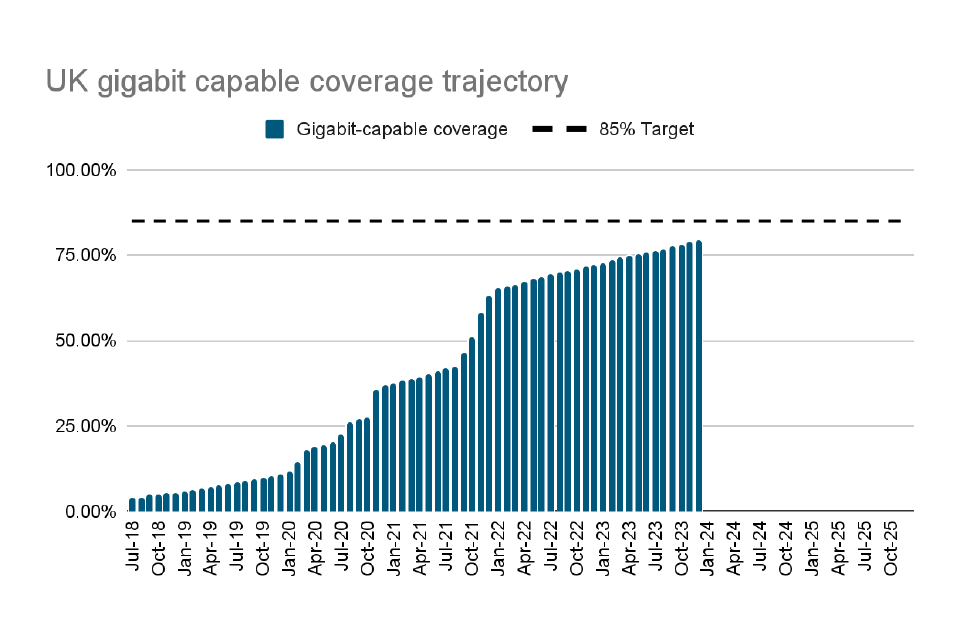
At over 79% gigabit capable coverage, we remain on track to deliver the target of gigabit capable connectivity to at least 85% of UK premises by the end of 2025.
Combined commercial and residential gigabit-capable coverage across the devolved administrations (Source: ThinkBroadband, December 2023) and broken down by rurality and type of infrastructure (Source: Ofcom, Connected Nations Report Update, September 2023. Data accurate as of May 2023.)
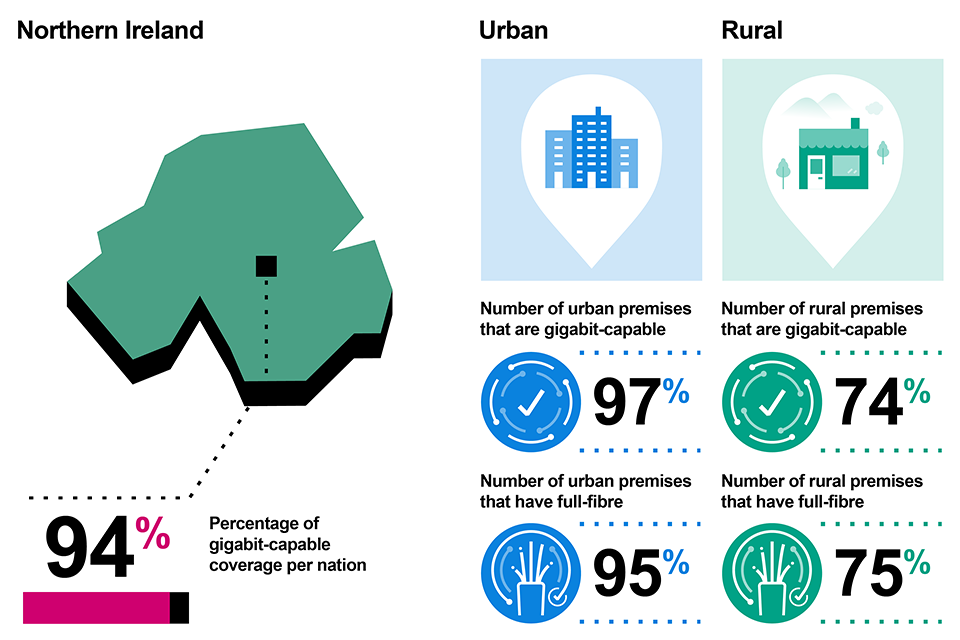
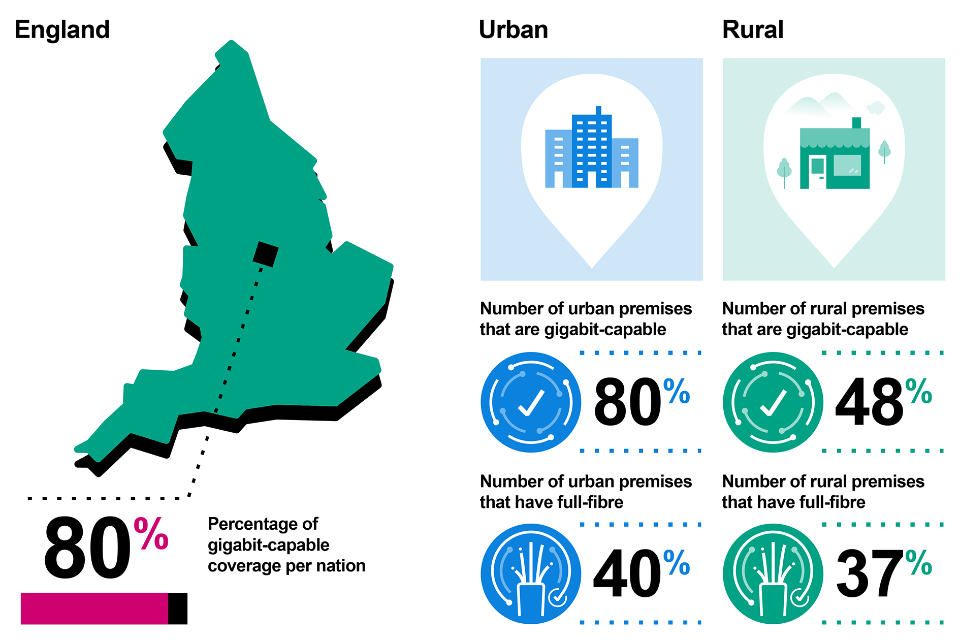
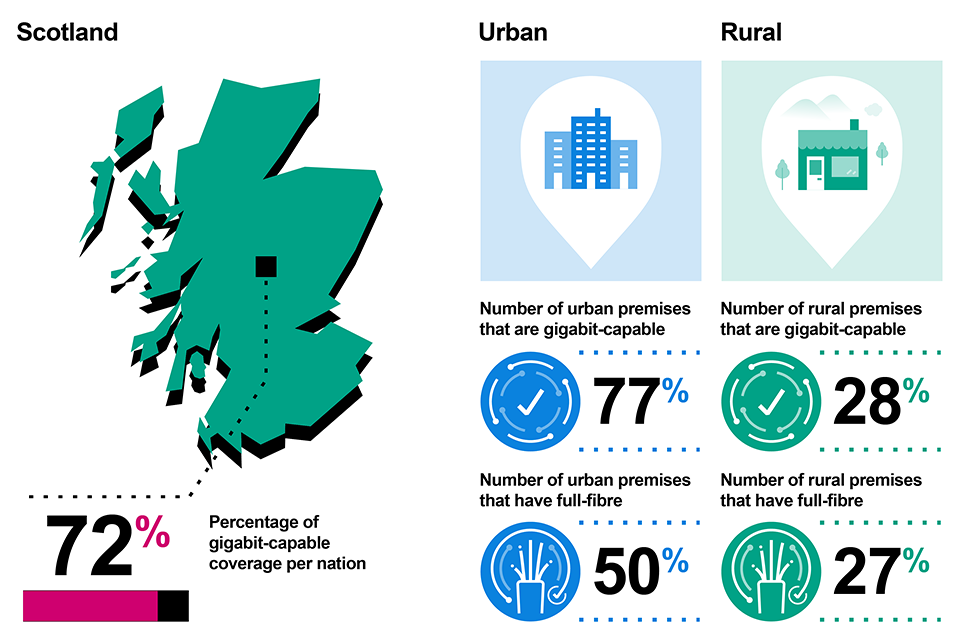
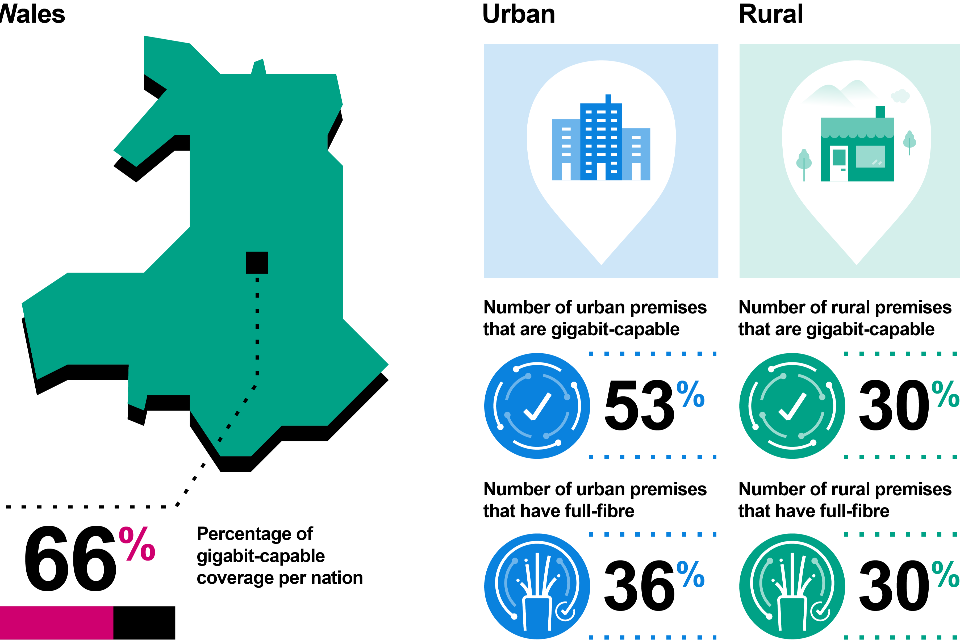
The most significant regional growth since our last update in September 2023 has been in the North East, where an additional 5% of premises now have access to gigabit capable connectivity since our last update. Despite having a large number of hard to reach premises in rural areas, this moves the North East from the eighth to sixth most gigabit capable region within the UK.
Gigabit-capable coverage by region and devolved administration and local region, previous 12 months growth [Source: ThinkBroadband, 4th December 2023]
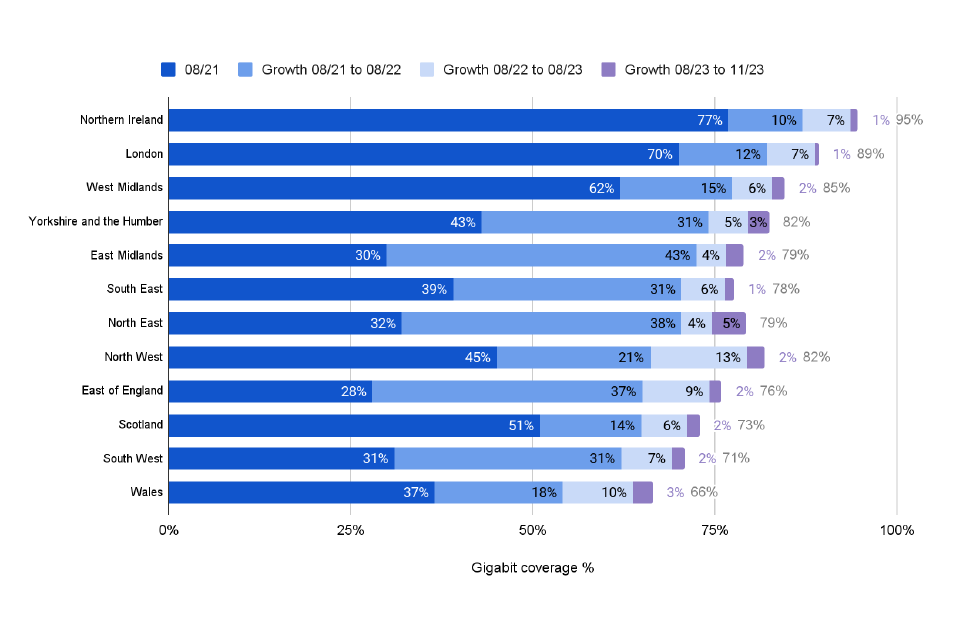
In September 2023 (the latest date for which this information was collected by Ofcom), 51% of business premises had access to gigabit-capable broadband. This comprises 28% of business premises coverage in rural areas and 55% in urban areas.
Gigabit-capable coverage by business premises - (Source: Ofcom, Connected Nations Report Update, September 2023. Data accurate as of May 2023)
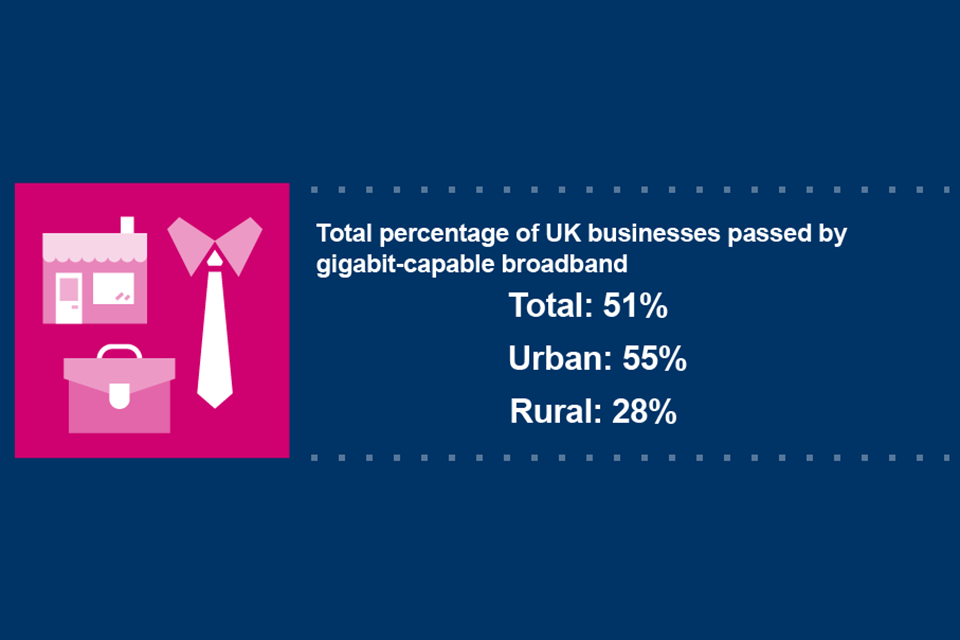
Update on Project Gigabit Delivery Plans
Project Gigabit procurements
Since our September 2023 progress update, we have signed a further four contracts covering North East Staffordshire, North Oxfordshire, South Oxfordshire, and Derbyshire. In total these contracts represent £76m of government investment to deliver gigabit-capable broadband to up to 33,000 premises that would otherwise miss out. We now have 16 signed Project Gigabit contracts worth over £660 million covering over 400,000 premises. We expect to finalise further contracts in the coming months.
We continue to consult the market to understand interest for delivering gigabit-capable connectivity supported by government subsidy in the remaining parts of Shropshire, East Surrey, Essex and Herefordshire, where commercial deployment will not reach.
The supplier initially awarded a contract to roll out Project Gigabit in the North East is no longer in a position to sign the contract that it had bid for.
The latest national Open Market Review (OMR) - our survey of suppliers’ commercial build plans across the UK - ran from 19 September until 16 October and responses are currently being evaluated and assured.
Project Gigabit Procurement Progress [Source: BDUK. Data is accurate as of 12 December 2023.]
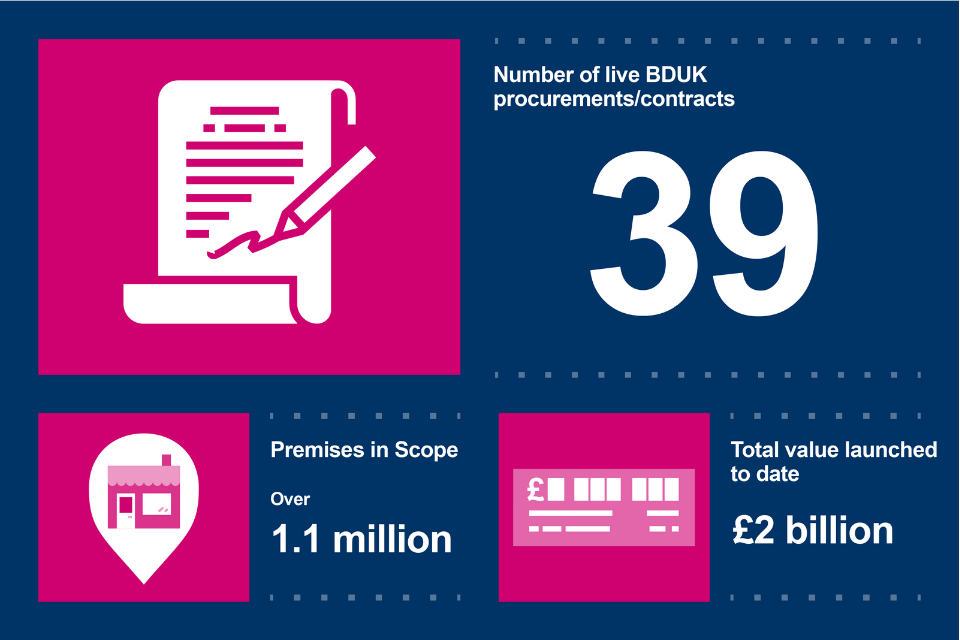
Project Gigabit Intervention Areas Map
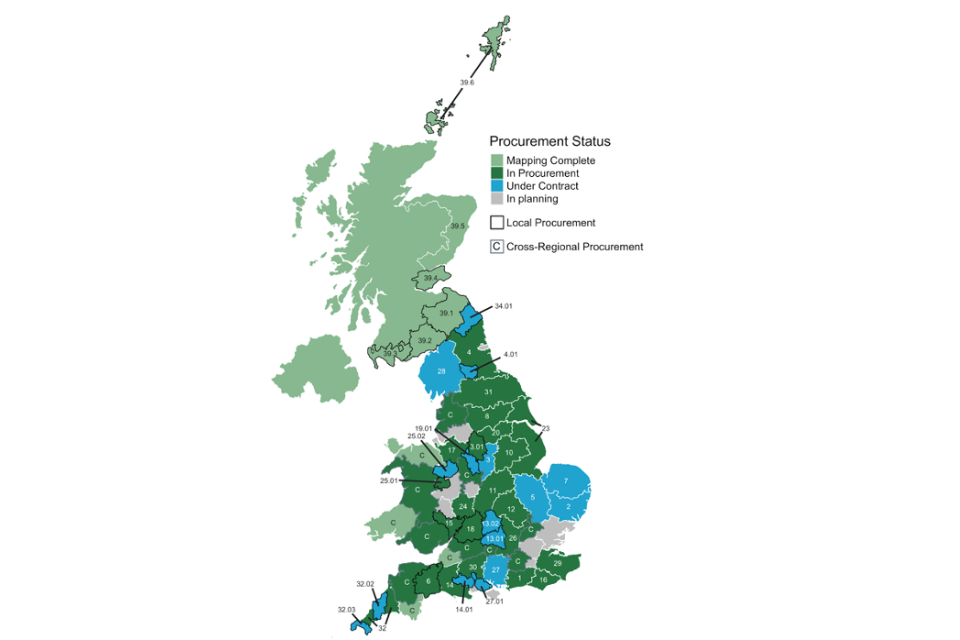
Gigabit Vouchers
Gigabit vouchers continue to deliver connectivity across the UK. More than 108,000 vouchers have been used to fund a connection so far through current and previous schemes. BDUK continues to work closely with suppliers, supporting new applications for voucher projects in suitable areas.
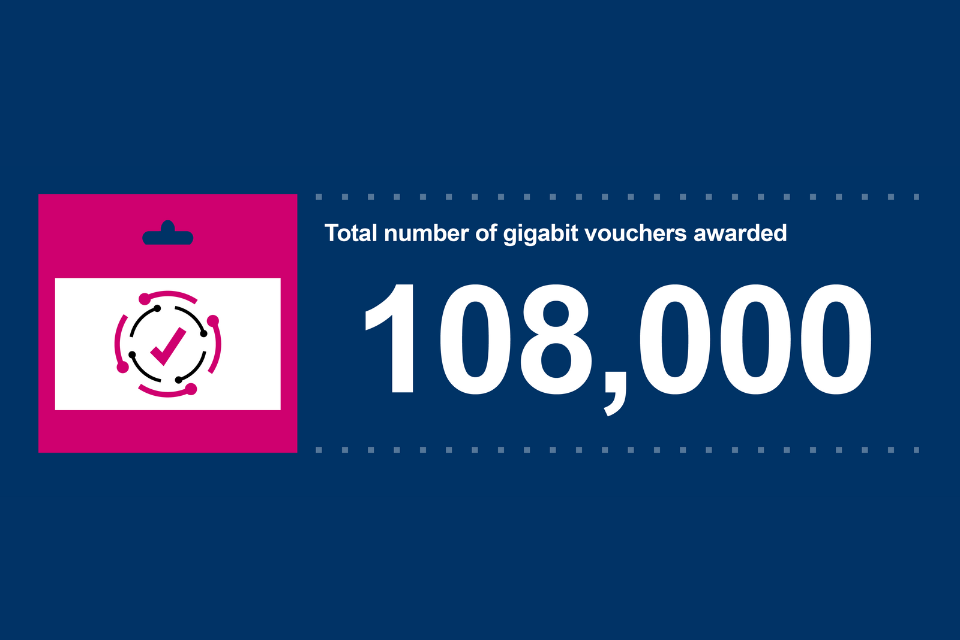
Public Sector Hub upgrades
Working in partnership with Oxfordshire County Council, our public sector hub project across Oxfordshire has completed delivery to 45 sites. The high-speed connectivity will help improve the delivery of public services across the county. For example, GPs will be able to provide remote video consultations and whole classes of schoolchildren can be online at once with no interruptions. The project in Dorset has provided connectivity to 19 sites and is due to be completed by the end of December 2023, while the project in Leicestershire has started and eight sites have already been connected, with the remainder set to be delivered by March 2024.
The Department for Education’s procurement is now well advanced for a project to provide connectivity to schools across England outside of suppliers’ commercial build plans. With commercial delivery and Project Gigabit rollout expanding deeper into hard-to-reach areas, we have updated the number of schools that will require support from BDUK. In total, more than 800 schools are in scope to benefit from this project, with delivery expected to start in early 2024 and complete by March 2026.
One of the evaluation reports we recently published studied the impact of our Rural Gigabit Connectivity hubs programme in schools. Schools surveyed reported that both administrative and teaching activities were benefiting from the faster connection, with 60% of respondents seeing workloads reduced as technological changes enabled by their new connections are adopted by schools. Overall, 95% of survey respondents felt positive about technology and pupil attainment, believing either that improved technology contributed to pupil attainment or expected it to do so in the future.
Project Gigabit across the Union
BDUK’s Annual Report and Accounts includes a breakdown of our delivery across the Union in 2022 to 2023. Across Scotland, Wales and Northern Ireland, 68,100 premises gained access to gigabit capable connectivity through publicly-funded delivery - an average of nearly 200 per day. Premises passed for each nation in 2022 to 2023 are shown below.
Scotland
Following the publication of the Public Review in September 2023, the Scottish Government and BDUK carried out a pre-procurement market engagement exercise, seeking feedback from suppliers on potential Project Gigabit procurements in Scotland. Initial findings suggest that there is potential supplier interest in one regional procurement and five local procurements in the following areas; Borders, Midlothian, East Lothian Dumfries & Galloway, Fife, Perth & Kinross, Orkney, Shetland, Dundee, Aberdeenshire and Moray Coast.
BDUK will be looking at options for the rest of Scotland in more detail in 2024, and will be dependent on further market engagement activity.
The Scottish Government has also launched a consultation, which closed on 12 December 2023, on proposals to equip new build homes with gigabit-ready infrastructure.
The Scottish Government’s £600 million Reaching 100% Programme (R100), which has received £49.5 million of UK government funding, has now provided gigabit connectivity to over 37,000 premises across Scotland.
Gigabit Broadband Voucher Scheme projects continue to be built in Scotland. To date, 4,600 vouchers have been used to deliver a gigabit-capable connection to homes and businesses outside of suppliers’ commercial build plans.
Wales
Areas across North West Wales, Mid Wales and South East Wales are included within the cross-regional procurement that launched in July 2023. North Wales and South West Wales will also be included within a further cross-regional procurement once a contract is in place. Further proposals for voucher projects in South West Wales are currently being considered by BDUK ahead of this process beginning.
As of the end of November 2023, BDUK has connected 3,800 homes and businesses in parts of Wales using vouchers. The Welsh Government’s Superfast Cymru programme has completed delivery of gigabit-capable infrastructure in Wales and in total, across all contracts, has provided just under 100,000 premises with access to gigabit-capable broadband.
Northern Ireland
Project Stratum continues to build ahead of target, having delivered gigabit-capable broadband to 74,000 of the 84,000 contracted premises to date. ThinkBroadband reports that full fibre coverage across Northern Ireland has reached 94%, and both Project Stratum and Project Gigabit will help close the remaining connectivity gap, where required.
The Public Review for Project Gigabit closed in July 2023 and supplier returns have since been evaluated by the Department for Economy (DfE), supported by BDUK. In turn, work on the Intervention Area design and costing has now begun. Once completed, the procurement process will get under way. The release of tender documentation for appropriate interventions is anticipated in early 2024.
Relevant policy, legislative and regulatory update
Smart Infrastructure Pilots Programme (SIPP)
In June DSIT launched the SIPP competition for local authority-led pilots to help better understand the benefits of utilising street furniture and other assets for network deployment. Six local authorities were awarded a total of over £1.3 million, with successful projects ranging from smart poles in Cambridgeshire and Oxfordshire, to the connection and digital regeneration of Irvine Harbour in North Ayrshire.
The programme supports the implementation of our UK Wireless Infrastructure Strategy, which sets out a clear vision for how advanced wireless infrastructure can become an integral part of the fabric of the UK’s economy and society by 2030, and how we want people, business and public services across the UK to realise the full benefits of 5G and other advanced wireless connectivity.
Barrier Busting
Work is ongoing to implement the telecommunications provisions within the Product Security and Telecommunications Infrastructure Act 2022. In November, new provisions came into force, allowing courts to impose modified terms on an interim basis where the renewal terms of an agreement are disputed; and encouraging the use of Alternative Dispute Resolution (ADR) as a means of reaching consensual agreements without court proceedings. The Government implemented additional regulations in November that will allow all Code disputes to commence in the First-tier Tribunal from spring next year. This should speed up and reduce the cost of litigation where this proves necessary. DSIT continues to work at pace on implementation of the remaining provisions in the Act.
DSIT continues to work with DfT to trial more flexible street works permits. An independent contractor has been appointed to scope and evaluate the trials, and is currently engaging with stakeholders to inform that process. The trials themselves are expected to begin in early 2024, and the department is working with suppliers to understand where subsidised build could be included in the programme.
Very Hard To Reach Premises
On Monday 2 October, the Department for Science, Innovation and Technology (DSIT), launched two consultations, one on the Broadband Universal Service Obligation (USO) and one setting out the government’s proposed policy approach to connecting Very Hard to Reach (VHTR) premises across the UK. Both consultations were launched simultaneously to enable DSIT to ensure that policy objectives are aligned across both areas. The consultations closed on 27 November. The Department will issue a response to both consultations in the New Year.
For further information, please visit these links for the consultation on VHTR premises and reviewing the USO.
The Department for Science, Innovation and Technology previously announced the launch of an £8 million fund to provide capital grants to further promote new satellite connectivity to a small cohort of up to 35,000 of the very hardest to reach premises. It is the government’s intention that the scheme will begin taking applications for these grants from early 2024.
The Alpha Trial programme, launched in December 2022 to test the capability and viability of low earth orbit satellites to deliver high-speed connectivity, has deployed to a number of sites. We will continue to collect both qualitative and quantitative evidence as part of our policy development work.
Rural Connectivity Accelerator
In June 2023 DSIT was awarded £7.3m funding for the Rural Connectivity Accelerator, as part of a joint Shared Outcomes Fund bid with DEFRA and DCMS.
The Rural Connectivity Accelerator will test new ways to bring together satellite, wireless and fixed line internet connectivity to help support agricultural and tourism businesses to access fast, reliable connectivity in remote areas for the first time. The results of the new approaches will also help rural businesses make the most of new agricultural technologies by improving connectivity on their land, for example using new drone technology to monitor crops and livestock in real-time, support landscape and wildlife conservation efforts, or develop interactive experiences for tourists.
The programme will help to deliver up to 10 pilot projects in rural and remote areas that aim to focus on addressing high-impact barriers to deployment of hybrid (satellite-based) networks and other types of connectivity solutions. This will be based on a detailed understanding of the connectivity needs of rural and agricultural communities.
This programme has now been fully mobilised and is engaging with technology providers and potential participants. We expect to be in a position to share more information about the specific sites that will be deployed to, and the technologies that will be used, in Spring 2024.
Annex
Project Gigabit procurement pipeline
Live contracts:
| Local or regional supplier procurement | Area and Lot number | Contract signature date | Estimated number of premises in scope of the contract (subject to change) | Contract value | Contracted supplier |
|---|---|---|---|---|---|
| Local | North Dorset (Lot 14.01) | 25 August 2022 | 7,000 | £6.3 million | Wessex Internet |
| Local | Teesdale (Lot 4.01) | 22 September 2022 | 4,000 | £6.7 million | Gofibre |
| Local | North Northumberland (Lot 34.01) | 14 October 2022 | 3,700 | £7.4 million | Gofibre |
| Regional | Cumbria (Lot 28) | 29 November 2022 | 59,000 | £108.5 million | Fibrus |
| Local | Central Cornwall (Lot 32.02) | 19 January 2023 | 9,200 | £18 million | Wildanet |
| Local | South West Cornwall (Lot 32.03) | 19 January 2023 | 9,500 | £18 million | Wildanet |
| Regional | Cambridgeshire and adjacent areas (Lot 5) | 23 March 2023 | 44,400 | £69 million | CityFibre |
| Local | New Forest (Lot 27.01) | 27 March 2023 | 10,400 | £13.8 million | Wessex Internet |
| Local | North Shropshire (Lot 25.02) | 19 April 2023 | 12,000 | £24 million | Freedom Fibre |
| Regional | Norfolk (Lot 7) | 28 June 2023 | 62,200 | £114.2 million | CityFibre |
| Regional | Suffolk (Lot 2) | 28 June 2023 | 79,500 | £100.5 million | CityFibre |
| Regional | Hampshire (Lot 27) | 28 June 2023 | 75,500 | £104.2 million | CityFibre |
| Local | North East Staffordshire (Lot 19.01) | 31 October 2023 | 5,900 | £16.5 million | Connect Fibre |
| Local | South Oxfordshire (Lot 13.01) | October 2023 | 5,500 | £17 million | Gigaclear |
| Local | North Oxfordshire (Lot 13.02) | October 2023 | 4,300 | £9.4 million | Gigaclear |
| Regional | Derbyshire (Lot 3) | November 2023 | 18,200 | £33.4 million | Connect Fibre |
| Total (rounded) | 410,300 | £666.9 million |
Live procurements (premises numbers and contract values as of 05/12):
The tables below show the live procurements posted on the GOV.UK website.
| Local, regional or cross regional procurement | Area and Lot number | Procurement start date | Estimated contract award date (subject to change) | Number of premises in the scope of the procurement (subject to change) | Indicative contract value (£ million) (subject to change) |
|---|---|---|---|---|---|
| Regional | Buckinghamshire, (part of) Hertfordshire and East of Berkshire (Lot 26) | November 2022 | September 2023 | 34,200 | £58.8 million |
| Local | Mid-West Shropshire (Lot 25.01) | 18 May 2023 | September 2023 | 6,000 | £12 million |
| Regional | Bedfordshire, Northamptonshire and Milton Keynes (Lot 12) | 28 February 2023 | November 2023 | 30,300 | £51.4 million |
| Regional | Leicestershire and Warwickshire (Lot 11) | 23 March 2023 | November 2023 | 45,400 | £71.5 million |
| Regional | North East England (Lot 4) | 7 November 2023 | December 2023/TBC | 53,200 | £82.7 million |
| Regional | Kent (Lot 29) | 13 December 2022 | December 2023 to January 2024 | 72,000 | £112.3 million |
| Regional | West and East Sussex (Lots 16 and 1) | 13 January 2023 | December 2023 to January 2024 | 62,100 | £100.6 million |
| Regional | West Yorkshire and York Area (Lot 8) | 27 April 2023 | December 2023 to January 2024 | 29,000 | £60.9 million |
| Regional | South Yorkshire (Lot 20) | 27 April 2023 | December 2023 to January 2024 | 32,400 | £44.4 million |
| Regional | South Wiltshire (Lot 30) | 17 February 2023 | January 2024 | 19,000 | £24.8 million |
| Regional | Worcestershire (Lot 24) | 6 October 2022 | January 2024 | 18,400 | £39.4 million |
| Regional | Nottinghamshire and West of Lincolnshire (Lot 10) | 24 March 2023 | January 2023 | 35,700 | £58.6 million |
| Regional | Dorset and South Somerset (Lot 14) | 30 May 2023 | January to March 2024 | 22,600 | £43.2 million |
| Regional | Cheshire (Lot 17) | 6 July 2023 | January to March 2024 | 17,700 | £44.7 million |
| Local | West Herefordshire and Forest of Dean (Lot 15) | 1 August 2023 | January to March 2024 | 7,900 | £23.4 million |
| Local | East Gloucestershire (Lot 18) | 1 August 2023 | January to March 2024 | 4,900 | £16.6 million |
| Local | Peak District (Lot 3.01) | 9 August 2023 | January to March 2024 | 4,600 | £10.7 million |
| Local | Mid/East Devon and West Somerset (Lot 6) | 1 September 2023 | March to May 2024 | 6,300 | £18.4 million |
| Regional | Lincolnshire (including NE Lincolnshire and N Lincolnshire) and East Riding (Lot 23) | 25 July 2023 | April to June 2024 | 73,800 | £118 million |
| Regional | Cornwall and Isles of Scilly (Lot 32) | 23 June 2023 | April to June 2024 | 18,600 | £41.2 million |
| Regional | North Yorkshire (Lot 31) | 23 June 2023 | April to June 2024 | 39,900 | £73.4 million |
| Cross Regional | Lancashire North Wiltshire and South Gloucestershire West and Mid-Surrey Staffordshire West Berkshire Hertfordshire (Call-Off 1) | 27 July 2023 | July 2024 to September 2024 | 57,500 | £149.7 million |
| Cross Regional | West and North Devon, North West, Mid and South East Wales (Call-Off 2) | 27 July 2023 | July 2024 to September 2024 | 47,100 | £139.1 million |
| Total (rounded) | 738,600 | £1,395.8 million |
Upcoming procurements:
| Local or regional or cross regional procurement | Area and Lot Number | Procurement start date | Estimated contract award date (subject to change) | Estimated number of premises outside supplier plans (subject to change) | Indicative contract value (£ million) (subject to change) |
|---|---|---|---|---|---|
| Cross Regional | North Wales, South West Wales, North Somerset, South West Devon (Call-Off 3) | July 2024 to September 2024 | March 2025 to May 2025 | 103,000 | £216 million |
| Local | South Scotland - Borders, Midlothian, East Lothian | TBC | TBC | 8,800 | £21.4 million |
| Local | Dumfries & Galloway- East | TBC | TBC | 7,700 | £15.5 million |
| Local | Dumfries & Galloway - West | TBC | TBC | 8,000 | £13.1 million |
| Local | Fife, Perth & Kinross | TBC | TBC | 11,400 | £21.9 million |
| Local | Orkney & Shetland | TBC | TBC | 11,300 | £23.7 million |
| Regional | Dundee, Aberdeenshire & Moray Coast | TBC | TBC | 57,700 | £95.5 million |
| Regional | Northern Ireland | TBC | TBC | 59,000 | TBC |
| Total (rounded) | 266,900 | £407.1 million |
Gigabit Vouchers Issued/Claimed
| Fiscal Year | Total Vouchers issued | of which yet to be connected | of which used to fund a connection |
|---|---|---|---|
| 2017 to 2018 | 40 | 0 | 40 |
| 2018 to 2019 | 6,900 | 0 | 6,900 |
| 2019 to 2020 | 15,800 | 0 | 15,800 |
| 2020 to 2021 | 18,400 | 0 | 18,400 |
| 2021 to 2022 | 23,600 | 700 | 22,900 |
| 2022 to 2023 | 34,000 | 8,500 | 25,500 |
| 2023 to 2024 (p) | 31,100 | 12,300 | 18,700 |
| TOTAL | 129,800 | 21,600 | 108,200 |
Source: BDUK as of December 2023
(p) - Provisional
Notes:
- Figures rounded to the nearest 100, except for 2017/18
- Removal of 2 vouchers from 2021/22 figures due to voucher status change
Public Sector Hubs*
- Please note that Local Full Fibre Networks (LFFN) figures have been revised up by 800 from the 2022 to 2023 BDUK Performance Report, due to a data processing error.
| Fiscal Year | Rural Gigabit Connectivity | LFFN (r) | GigaHubs | Total (r) |
|---|---|---|---|---|
| 2017 to 2018 | 0 | 0 | 0 | 0 |
| 2018 to 2019 | 0 | 10 | 0 | 10 |
| 2019 to 2020 (r) | 20 | 300 | 0 | 330 |
| 2020 to 2021 (r) | 220 | 1,360 | 0 | 1,580 |
| 2021 to 2022 (r) | 770 | 2,540 | 10 | 3,310 |
| 2022 to 2023 (r) | <5 | 10 | 40 | 50 |
| 2023 to 2024 (r) | 0 | 0 | 20 | 20 |
| Total (r) | 1,000 | 4,220 | 70 | 5,290 |
Source: BDUK as of December 2023
(p) - Provisional (r) - Revised <5 - denotes delivery of fewer than 5 hubs, but more than 0
Notes:
- Figures rounded to the nearest 10
- LFFN includes only hubs whereas we previously also reported assets
- Gigahubs delivered are counted when status moves to “build - not live” and a connection date is present
- These figures have been aligned with our reporting approach for the performance report
- Total LFFN figures have been revised up by 800 from the 2022/23 Annual Report and Accounts. This was due to a data processing error
-
Data used from the independent website ThinkBroadband throughout this report can be accessed through the following link: https://labs.thinkbroadband.com/local/ ↩
